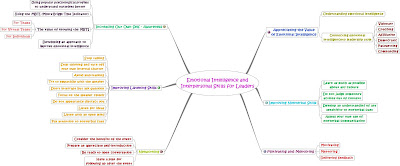In this chapter, leaders need strong emotional intelligence and outstanding interpersonal skills. Emotional intelligence also called emotional quotient or EQ. Without emotional intelligence, leaders cannot communicate and connect with others effectively. Our successful interactions with others depend on communication: The basis of any relationship is communication. Without communication – be it sign language, body language, e-mail, or face-to-face conversation.
Appreciating the value of emotional intelligence: The leaders reveal emotional intelligence through their communication ability and style.
Increasing our own self awareness: The first step toward emotional intelligence is self-awareness. What is important to realize is that we can develop our emotional intelligence and improve our leadership communication ability and need to understand strengths and weaknesses first.
Improving nonverbal skills: Nonverbal expressions are usually categorized into one of the following groups: Appearance, Paralanguage, Kinesics, Occulesics, Proxemics, Facial expressions, Olfactics, and Chronomics. The meaning of nonverbal communication involving body language differs substantially from culture to culture.
Improving listening skills: Good listening skills are essential, and the lack of them hinders many people’s careers. Most do not realize that good listening is hard work.
This chapter provides 10 ways to improve listening habits:
- Stop talking.
- Stop thinking what you are going to say.
- Avoid multitasking.
- Try to empathize with the speaker.
- Don’t interrupt.
- Focus on the speaker closely.
- Do not let appearance distract.
- Listen for ideas.
- Listen with an open mind.
- Pay attention to nonverbal cues.
Motivating and Mentoring: Leaders need to be particularly sensitive to the feelings of others and able to establish ways to motivate and guide them that work with our personality and with theirs.
Networking: Today it is a necessary part of doing business in all professional. All professional work long hours and find breaking away a challenge, but making the time to network offers learning opportunities and help us build the relationships that may be essential to advance in many career areas.

No comments:
Post a Comment